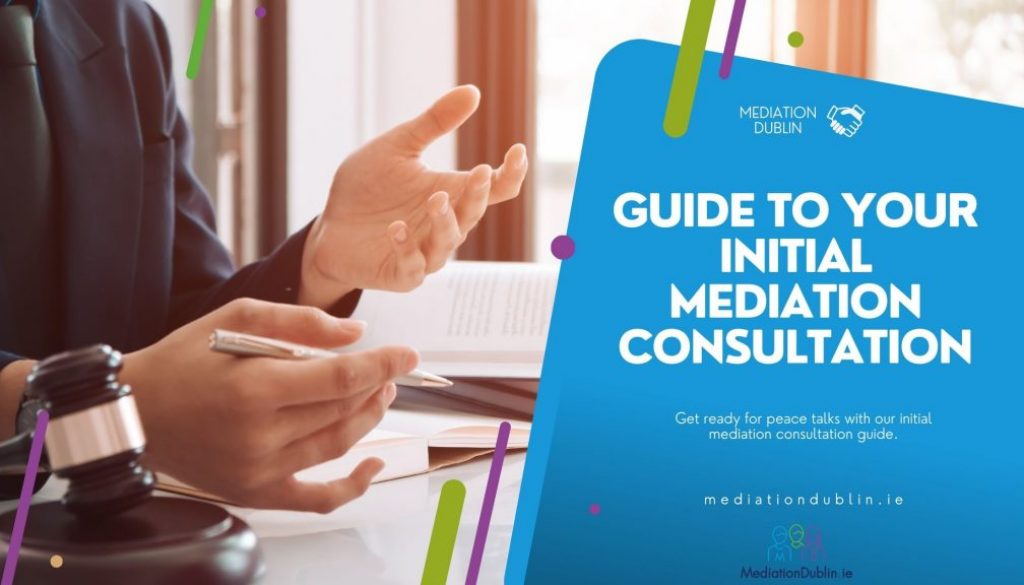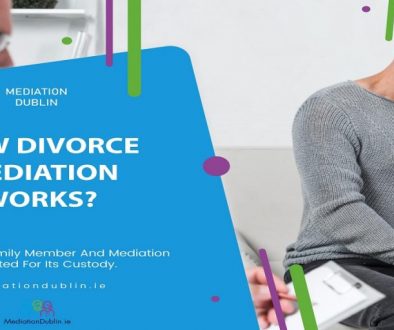Guide To Your Initial Mediation Consultation

Introduction
Mediation is an alternative dispute resolution process that is becoming increasingly popular as people seek to avoid the costs and stress of going to Court. It’s a confidential process that involves a neutral third-party Mediator who helps parties in conflict to find a mutually acceptable solution.
If you’re considering mediation for the first time, it’s important to know what to expect during your initial consultation with a Mediator. Here’s a guide to help you prepare for this meeting.
What to Do Before Your Consultation:
Before your consultation, you should take some time to prepare yourself.
Step:1 Research the Mediator and Their Background
Start by researching the Mediator and their background. Look for a Mediator who has experience in your type of case and who has good qualifications and experience. You should establish that they are a current member of a recognised mediation body such as the Mediators Institute of Ireland – the MII for short. The Mediator should have MII displayed on their website or alongside their name.
Step:2 Consider Your Goals and Priorities for the Mediation
Next, consider your goals and priorities for the mediation services. What do you want to achieve? What are the most important issues for you? Having a clear idea of what you want to accomplish will help you communicate more effectively with the Mediator during the consultation.
Step:3 Gather Relevant Documents or Information
Finally, gather any relevant documents or information that you may need to reference during the consultation. This might include contracts, emails, or other correspondence that relates to your case.
The Consultation Process:
During the initial consultation, the Mediator will explain their role and the purpose of the consultation. They’ll also ask you to describe your goals and priorities for the mediation. This is an opportunity for you to explain what you hope to achieve and what you’re willing to compromise on.
Step:1 Assessment of Suitability for Mediation
The Mediator may ask you some questions about your situation, including any legal or financial issues that may be relevant. They may also ask you about your relationship with the other party and your communication styles.
After gathering this information, the Mediator will assess the suitability of mediation for your situation. They may determine that mediation is not appropriate if there’s a power imbalance, if one party is unwilling to participate, or if there’s a risk of violence.
Step:2 Discussion of Next Steps
If mediation is deemed suitable, the Mediator will discuss the next steps with you, including scheduling a mediation session. They may also provide you with some general guidance on how to prepare for the mediation and what to expect during the process.
Tips for a Successful Consultation:
To make the most of your initial consultation, it’s important to be honest and open about your concerns and priorities. Listen carefully to the Mediator’s advice and guidance, and be willing to ask any questions you may have about the mediation process. It’s important to keep an open mind and be willing to compromise in order to reach a mutually acceptable solution.
What not to do in the initial mediation consultation:
Avoiding certain behaviours or actions during your initial mediation consultation can help ensure a smooth and productive experience. Here are some things to avoid:
Step:1 Being Hostile or Combative
During the consultation, it’s important to remain calm and avoid hostility or combative behaviour. This can create a negative atmosphere and make it more difficult to reach a mutually acceptable solution. Remember that the Mediator is a neutral third party and is there to help both parties find a resolution.
Step:2 Refusing to Listen to the Other Party
Mediation is a collaborative process that requires both parties to actively listen to each other’s perspectives and concerns. Refusing to listen or interrupting the other party can make it difficult to find common ground and reach a mutually acceptable solution. It’s important to be respectful and give the other party a chance to speak.
Step:3 Being Unprepared
To make the most of your initial consultation, it’s important to come prepared with relevant information and documents. Being unprepared can create unnecessary delays and make it more difficult to move forward with the mediation process.
Step:4 Focusing on Blame or Fault
The goal of mediation is to find a mutually acceptable solution, not to assign blame or fault. Focusing on blame can create a confrontational atmosphere and make it more difficult to find common ground. Instead, focus on finding a solution that works for both parties.
Step:5 Being Unwilling to Compromise
Compromise is a key component of the mediation process. Being unwilling to compromise can make it difficult to reach a mutually acceptable solution. It’s important to be open to different ideas and to be willing to make concessions in order to find a resolution.
By avoiding these common pitfalls, you can help ensure a successful initial consultation and increase your chances of finding a peaceful resolution through mediation.
Conclusion:
Mediation can be an effective way to resolve disputes and find a mutually acceptable solution. By preparing for your initial consultation and being willing to engage in the process, you can take the first step toward resolving your conflict and achieving a peaceful resolution.


